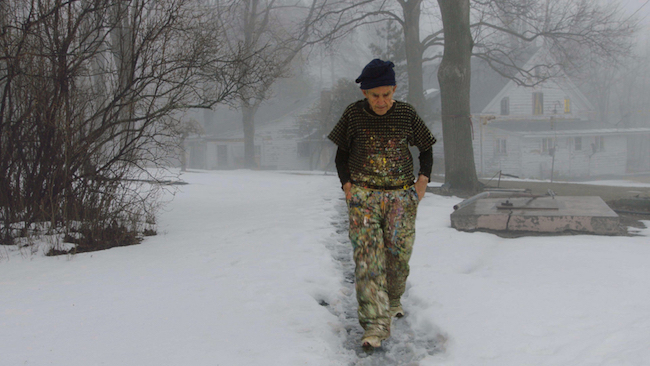Film Review: “The Price of Everything” — At What Cost?
There are words of wisdom for artists here: they offer a simultaneously nauseating and heartening view of the trade for those actively practicing.
The Price of Everything, directed by Nathaniel Kahn. At the Coolidge Corner Theatre, Brookline, MA, on October 26.

A scene from “The Price of Everything.”
By Heather Kapplow
The Price of Everything purports to take a deep dive into the contemporary art market, but it’s by necessity a shallow dive, because the waters themselves are not all that deep. The first collector interviewed, Stefan Edlis, puts it best: “To be an effective collector, you have to be shallow.” And with that keen observation, we’re set up to enter the muck.
Almost everyone interviewed who is involved in the art trade is relatively intelligent, but it feels as if there’s just something wrong with them — like something’s missing. It’s tempting to say that it’s their souls, but that’s not quite what it is. It’s more like they know how much irrationality is embedded in what they’re doing, but they can’t stop because of all the money involved. And the same thing applies to the artists: everyone seems to know the game they are playing makes absolutely no sense, but they can’t seem to stop playing. In some ways, the self-deception is fascinating, but listening to these people talk — the artists and art traders alike — leaves you feeling dirty by the end. As if you were complicit in playing a trick on someone.
The shooting itself is fairly messy — it’s often hand held and pulls focus mid-action –but this style ends up working really well with the subject matter. All that matters is the voice we’re hearing and that we are taking in just enough of the surroundings to stay oriented — and that feels like exactly what’s going on with the characters in this documentary. All they’re hearing is the chant to make or buy or sell art, as they rush through one totally-removed-from-the-real-world environment after another.
The intention of The Price of Everything is difficult to fathom. Does it want to undermine the art market? To point out inconsistencies in the market’s internal logic? Is it trying to warn or protect artists? Or to call them out for their hypocrisy? Ultimately, the film itself is intertwined with the culture it covers. Point blank, the film’s existence and potential box office/broadcast success relies on the trends in the market it is purportedly shedding light on. This film would have no audience if there wasn’t a ‘trickle down’ effect — fascination with the value of contemporary art sliding down from the gilded class to the middle class.
Still, The Price of Everything warrants recommending. For artists, there are many words of wisdom — it’s a simultaneously nauseating and heartening view of the trade for those actively practicing. Artists will know by the end of the film that ‘it’s not you, it’s them’ — that there’s no way in hell you can control the short term or long term popularity of your work. For casual art appreciators and culture workers, the documentary presents a complex take on the role of the museum in the art world. As for collectors — well, serious collectors aren’t going to watch this film. Unless they’re in it and want to make sure they came off sounding and looking good. But for aspiring and novice collectors, it’s an opportunity to get a glimpse into the minds of your role models, who are notoriously close-lipped. And for the vast majority of our population, trying to make ends meet on an insulting minimum wage while grappling with a psychedelically distorted housing market, it’s practically a call to revolution.
Heather Kapplow is a Boston-based conceptual artist. Her work involves exchanges with strangers, wielding talismans, alternative interpretations of existing environments, installation, performance, writing, audio, and video. See heatherkapplow.com for more detail.
